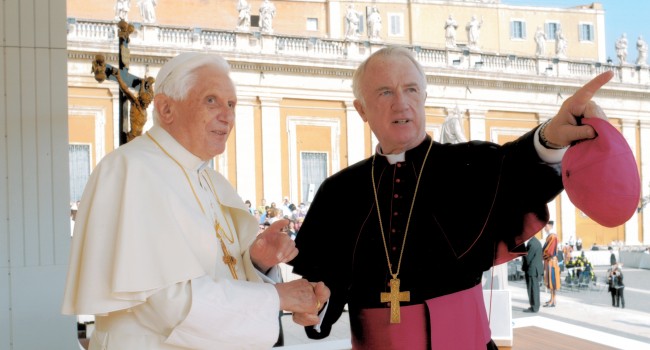Brennan finds it ‘self serving’
In a recent letter to the faithful Diocese of Wheeling-Charleston Bishop Mark Brennan offered a blunt review of what he called “the Bransfield saga” and former Bishop Michael Bransfield’s “non-apology.”
Some in the diocese are tired of the affair and want to move on, while others think Bransfield got off too lightly. “For my part,” he wrote, “I found his apology self-serving and lacking any recognition of, or contrition for actually having offended people.”
The full letter fills nearly four pages and the Bransfield section is the final of three. The first two points address the coronavirus pandemic and the way in which Catholics, as disciples of Christ, should approach the coming elections.
Turning to Bransfield, he notes that reaction to Bransfield’s public statement have been mixed.
As reported in August, Bransfield did not admit any wrongdoing in his four-paragraph apology letter. He apologized for how his actions were perceived. “I am writing to apologize for any scandal or wonderment caused by words or actions attributed to me.”
He wrote that during he tenure he was reimbursed for expenses that have been called into question as excessive and paid them back “even though I believed that such reimbursements to me were proper.”
He also wrote that there were allegations that some of his words and actions “caused certain priests and seminarians to feel sexually harassed. Although that was never my intent, if anything that I said or did caused others to feel that way, then I am profoundly sorry.”
Brennen wrote in his recent letter that he published Bransfield’s letter unaltered “trusting that our people would see it for the non-apology that it was, and they did.” Brennan said he deeply regrets the pain the scandal and betrayal caused.
While some think Bransfield should go to jail, Brennan wrote, that is a government matter, although the diocese cooperates with authorities investigating alleged crimes. And a lawsuit to recover any additional money from Bransfield would likely fail because courts prefer not to meddle in internal church affairs.
Brennan notes some have objected to still referring to Bransfield by his title of bishop, but he received that via ordination and Rome’s discipline doesn’t change that. Brennan chooses not to use the term “emeritus” for Bransfield because it connotes honor and esteem, “which neither we nor Rome attributes to the retired bishop.”
Brennan expresses understanding of people’s frustration. “One of the things we learn in life is that we don’t always get our way.” However, the diocese did get some satisfaction in this affair: The Holy See has never told a Bishop in the U.S. to apologize and make restitution.
“Rome did that to Bishop Bransfield, even if the ‘apology’ was anemic and the financial restitution, though substantial, was less than we initially sought.
“I do think,” he continued, that Rome’s decision was a ‘shot across the bow’ to bishops that outrageous conduct will not be tolerated and will be punished.”
Brennan concludes by saying he hopes the people of the diocese won’t get bogged down in endless quarrels.
“As some of you have told me,” he wrote, “we need to put the Bransfield saga behind us and move on to the work before us: making Christ known in this state and serving those in need.”
During the second week of September, Lay Catholic Voices for Change and Wheeling-based ACT: A Church Together issued a joint statement and sent a letter to Brennan regarding the Bransfield amends plan and his non-apology, as Brennan termed it.
In their letter, the groups laid out seven steps to further address the harm Bransfield caused. The Dominion Post reported at length on that letter at the time.
The Dominion Post contacted the groups on Thursday to see if they wished to comment on Brennan’s new letter. A spokesperson said they preferred not to comment at this time as they await Brennan’s response to their letter.
Tweet @dbeardtdp




